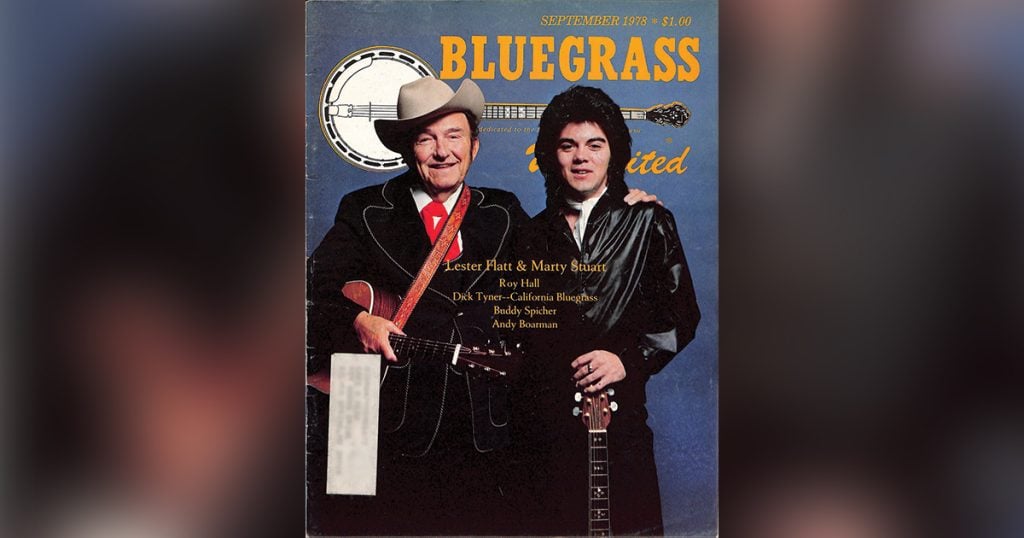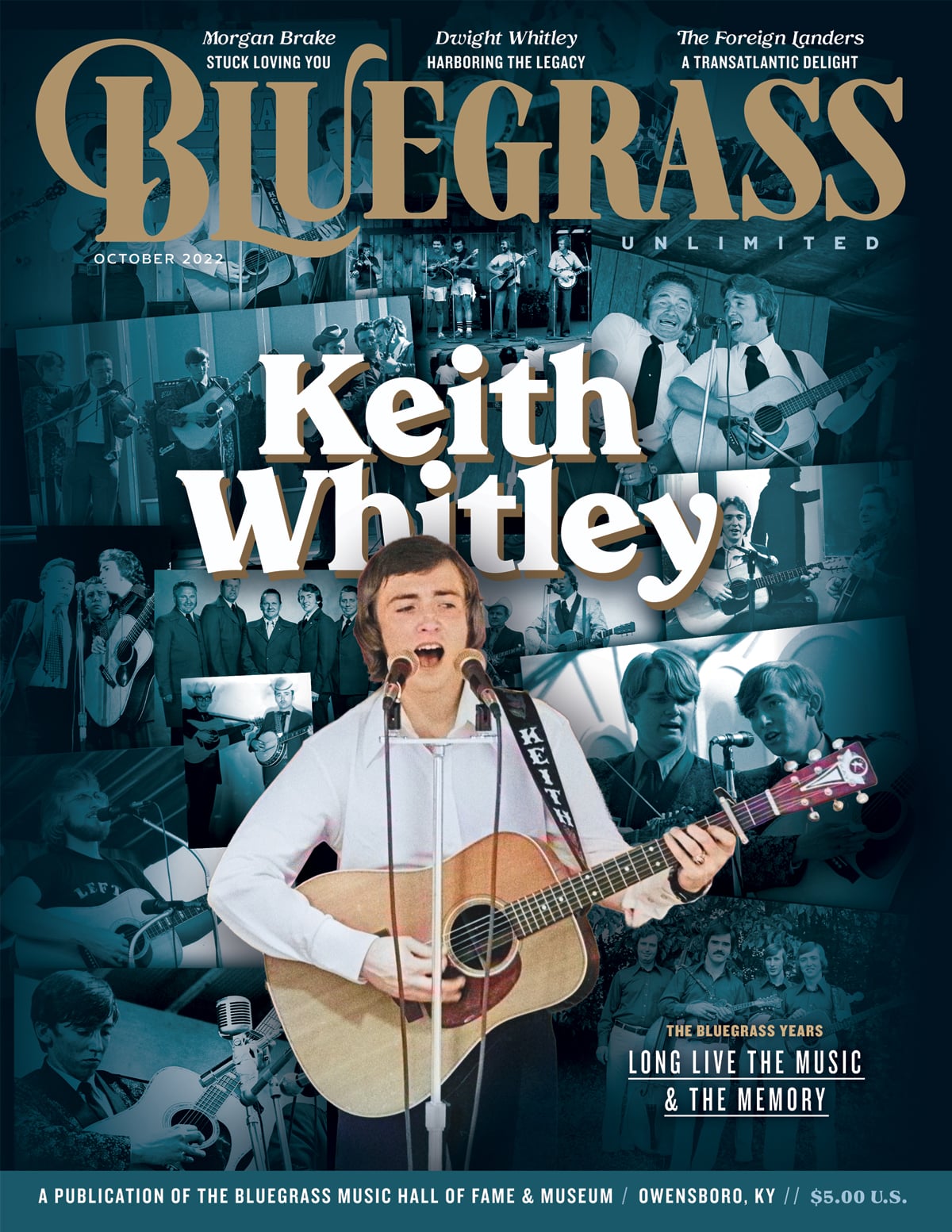Home > Articles > The Archives > Lester Flatt & Marty Stuart
Lester Flatt & Marty Stuart
Reprinted from Bluegrass Unlimited Magazine
September 1978, Volume 13, Number 3
“Precious memories, how they linger,
How they ever flood my soul.
In the stillness of the midnight, precious sacred scenes unfold.”
J.B. Wright
That song both opens and closes Marty Stuart’s “With A Little Help From My Friends” album. It is an appropriate number for the lyrics bring to mind a lot of memories the 19-year old mandolin/guitar player had acquired through his past six years of traveling with Lester Flatt.
It also is appropriate because it reflects on Stuart’s new-found religious way of life which has come about after several years of being chased by bluegrass groupies, taking illegal drugs and, in general, growing up faster than the average teenage youngster.
“I’ve learned to respect God a whole lot. He’s the biggest thing in my life now. A lot of people who saw me and knew me well a few years ago may think what I say now is a bunch of crap. I was reckless then. The drugs, the snuff queens and other things had turned me into a punk bluegrass figure. I learned what drugs and being an unstable person can do to you. Now, I have peace of mind and that outweighs money.”
The majority of music fans who have watched Stuart these past years playing with Flatt’s Nashville Grass group probably have no idea of the internal changes Stuart has gone through on his way to becoming a highly respected bluegrass musician.
He is still changing, not only on a personal level, but also in regard to his musical direction.
This direction of musical expression is very evident on the “With A Little Help From My Friends” album for Ridge Runner Records (RRR0013). The title song itself was composed by former Beatles John Lennon and Paul McCartney. Other non-bluegrass, non-country numbers include “Kansas City,” “Dock of the Bay,” “Mystery Train/Tiger Man” and also “Big Boss Man” and “Love Grown Cold,” both of which feature Stuart playing electric guitar.
Stuart still keeps his roots in bluegrass music however with such numbers as ‘‘Hard Hearted,” “Rawhide,” “Crazy Creek Blues,” Tompall Glaser’s “I Don’t Care Anymore,” plus “My Sally Goodin” on which Stuart plays the fiddle.
In addition to “Precious Memories,” Stuart also does “Just A Little Talk With Jesus.”
His “friends” on the album include his boss, Lester Flatt and other present and former Nashville Grass members Charlie Nixon, Kenny Ingram and Curley Seckler. Other good musicians including Jesse McReynolds make Stuart’s album a pleasure to hear.
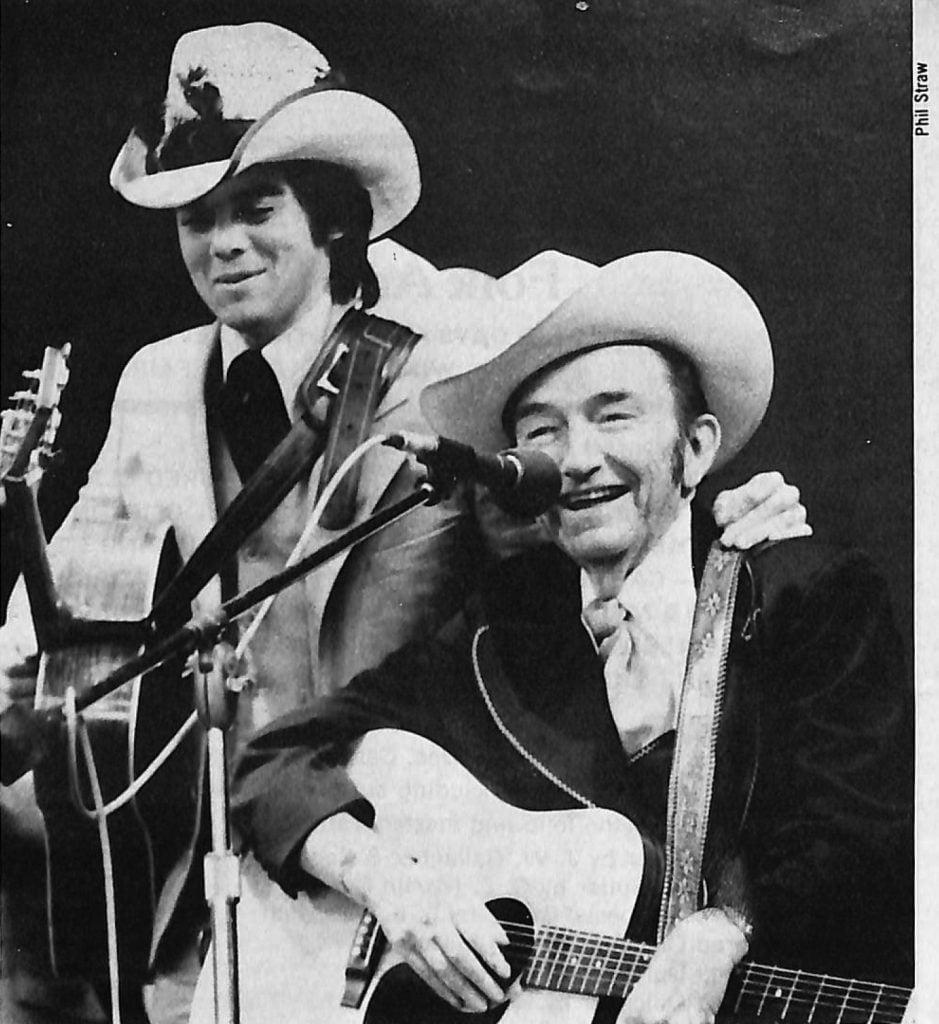
Marty talked about his experience with drugs, his life on the road with Flatt and his new direction recently at a bluegrass music festival held in Augusta, Georgia, a town internationally famous among golfing fans because of the prestigious “Masters Tournament.”
This year an Augusta based bluegrass group, The Byrd Family, decided to capitalize on the popularity of the tournament by sponsoring a bluegrass festival the concluding weekend of the tournament. The event, aptly named the “Masters Bluegrass Festival,” featured Bill Monroe, The Osborne Brothers, The Lewis Family, Betty Fisher and the Dixie Bluegrass Boys, Snuffy Jenkins and Pappy Sherrill, The Byrd Family, L.W. Lambert and The Blue River Boys, Ed Hurt, and a popular local band called Flatbed, as well as Lester Flatt’s group.
For several weeks prior to the festival, rumors had been circulating about Flatt’s poor health. The bluegrass legend has gone through both good and bad health periods following his July, 1975, open heart surgery. Lester noted however, “I don’t think there’s anybody who retires in this business. I enjoy performing now as much as I ever did. It gets in your blood, and you’re not satisfied unless you’re performing.”
Shortly after Flatt’s large, white bus pulled up at the festival site, I knocked on the door for an interview. After explaining who I was and my purpose, and checking with Flatt I found he would talk with me after he finished dressing for the show.
Band member Charlie Nixon remarked to me, “We try to cut his interviewing short right before a concert. He’s still weak, although he’s doing much better than a few weeks ago. We’re really proud of him.”
Flatt himself commented, “This is only the third trip for me out of Nashville since the first of the year. Flu and pneumonia have kept me under the weather. I stayed in the hospital for three weeks.”
He talked about performing in general saying, “My favorite work is colleges. They’re my cup of tea. College crowds really show their appreciation, and they make you work. They study the music, and if there’s 10 verses in a song, they want to hear every one of them. Two or three years ago, we were booked at the University of Alabama when a rock band cancelled out. There were seven or eight other rock bands on the show. It was real crowded, with the people bedded out like sweet potatoes. I looked at those people and wondered what we were doing there. We came out and did 45 minutes and got a standing ovation. We couldn’t understand it.”
Flatt spoke of his own bluegrass festival held annually at Pinnacle, North Carolina, near Winston-Salem, saying, “This will be the sixth year for it. We try to keep the rough stuff weeded out such as drinking and carrying on. We don’t go out and look in somebody’s coffee cup to see if they have something else in it, but if somebody has a bottle in the audience and is sitting next to a kid, we want them to move. I’m silly enough without drinking.”
When asked if a certain act would be on this year’s show Flatt replied, “To tell you the truth, I leave that up to Lance LeRoy (his long-time personal manager). I don’t know even if I’m going to be on it. Lance has been my right arm for eight years. He’s a good, honest man. You don’t find anybody like him everyday.”
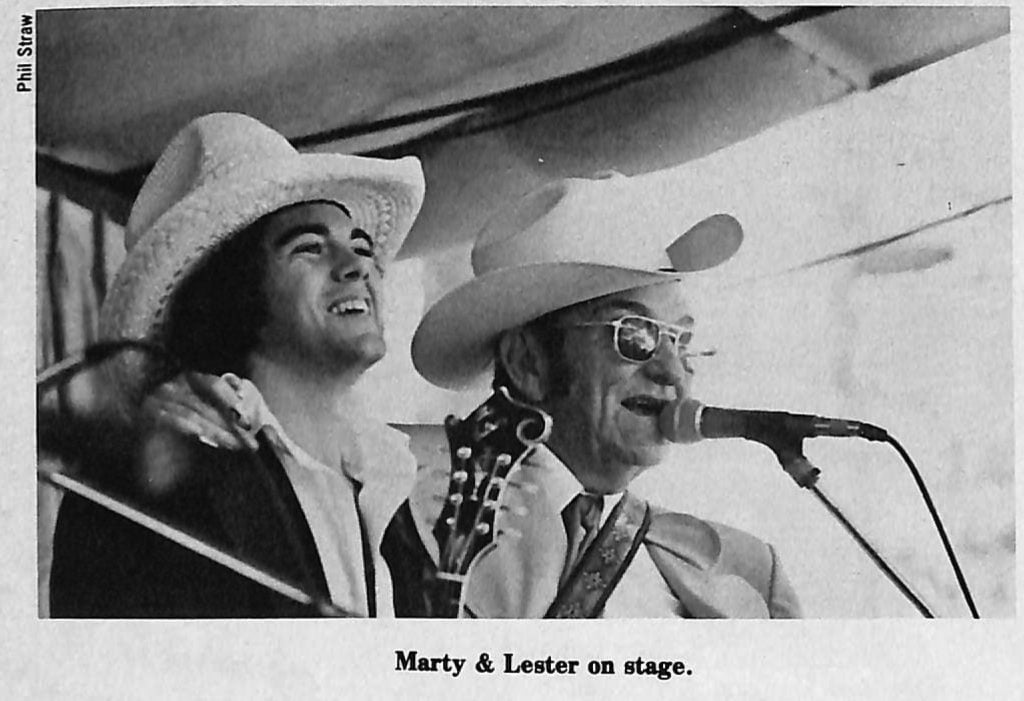
The conversation came around to his years with Earl Scruggs. “There’s been some promoters making offers around for a possible reunion. I haven’t talked to Earl about it, though, and he hasn’t talked with me. It could be something that might be worked out. It could be he doesn’t have that much against me.
“I wouldn’t care to do it with his group or with my group. I don’t understand what his group is trying to do, but he don’t bother me and I don’t bother him. I never say anything bad about Earl, and I don’t think he says anything bad about me. If we took some of the old Foggy Mountain Boys, maybe something could be done.”
Years and years ago, Bill Monroe left country music to continue traditional mountain sounds he called bluegrass music. Some more years passed two Monroe band members, Earl Scruggs and Lester Flatt, leaving to create the history making team of Flatt and Scruggs. Some more years passed with Flatt and Scruggs deciding to part. Scruggs said he wanted to explore other musical styles, while Flatt wanted to stay with his own familiar sound.
Now more years have passed with a member of Flatt’s group wanting to pursue other musical directions while holding on to part of the past. “When Lester quits or says I’m ready to go home. I’ve got to start thinking of Marty Stuart,” the youngest member of the Nashville Grass commented. “I feel like I’ve worked with the Rolls Royce of bluegrass music. I feel like I’ve worked with the best. I’d like to take what I’ve done and add to it. One of the biggest things I’ve learned from with working with Lester is staying real and honest. I figure you can apply that to anything you do.”
Stuart says he is “shooting for the younger audience” and playing easy rock music “that a banjo could fit right in.” He added, “I’m not trying to find an image. I’m trying to be myself.”
Stuart comes from Philadelphia, Mississippi, near the home area of banjo picker Carl Jackson.
“I spent one summer working with the Sullivan Family out of Alabama. The first album I was on was a Sullivan Family ‘live’ album. In August, 1972, I moved to Nashville with Roland White, who was playing mandolin for Lester Flatt. Roland invited me to a bluegrass festival in Delaware where I met Lester. I was playing in the back of the bus with Roland, when Lester came back, heard me playing snikered at me and went to bed. He later asked me if I wanted a job working with him playing guitar. I was 13 at the time, and he worked it out with my parents.
“In March of 1973, Roland left Lester to form a band with his brother, Clarence. Rather than finding a new mandolin player, Lester told me to go ahead and play the mandolin. I moved in with Lester in the summer of 1975, and I stayed with him for two years until my parents moved to Murfreesboro, Tennessee.”
Stuart spoke of his relationship to his employer saying, “Flatt is a whole lot more than a boss. I loved him when I lived with him, and I still love him like a father now. I usually call him Flatt. Lester’s too long. He calls himself Flatt. He says sometimes. ‘You’ll never catch ole Flatt doing that.’”
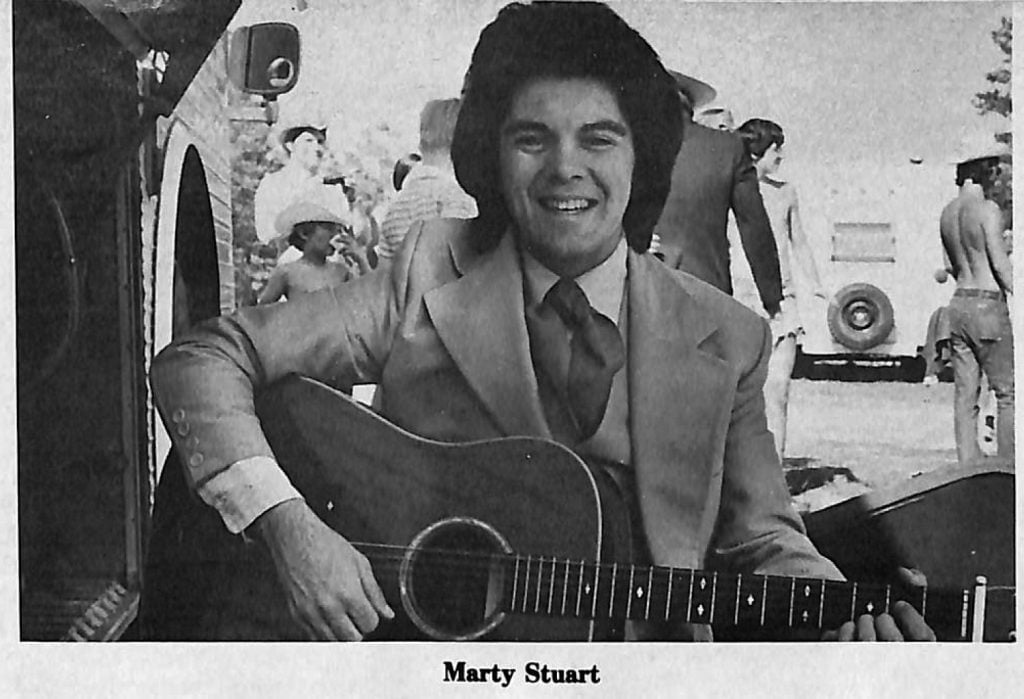
Although his mandolin skill is widely respected, Stuart related he prefers the guitar. “I think I get more soul into a guitar. A guitar’s my first love. God bless, Bill Monroe, though, he can put a lot of soul into mandolin playing. Right on stage now (indicating a performance in progress) is one of the best mandolin players I’ve heard, Bobby Osborne. He probably plays more mandolin on the bus than on stage. Jesse McReynolds and Roland White are also great mandolin players. I was influenced in my guitar playing by Clarence White. You shouldn’t copy anybody, but I think I have a lot of Clarence White’s flavor in my playing.”
As we were talking in a backstage area, two girls came up. One said softly to Stuart, “I live two blocks from here.” Stuart said to the girl, “You live two blocks from here?” and then winked at me. The girl continued, “You’ve got a pretty butt.” Stuart countered, “All it takes is a five pound bag of Martha White flour, and I’ll go with anybody.” He told the girls their city holds a special part in his memory. “I’ll never forget Augusta because I got a tatoo here.” At that he pulled up his right pants leg and showed the girls a large drawing of a devil tatooed on his thigh.
After the girls left, I asked Stuart what he thought of “snuff queens,” a nickname country music entertainers have for women who follow stars around to get more than their music.
“I don’t dig it, and I don’t respect it. I respect a lady, but you have to be nice to snuff queens, because they do buy your records,” Stuart said.
He began talking about life on the road and that led to Stuart talking about his experience with drugs.
“I learned the effects of drugs and what it can do to your life. I got to where I couldn’t look myself in the mirror. Whenever I was alone in a room, I would be jittery and nervous. I had a bad grass habit, and I knew at the rate and speed I was living, I wouldn’t last two years. After one session with a major rock group that was visiting Nashville, I wondered about where I was going.
“I was raised in a Christian home, and I knew it would take faith in God to change me. Faith is the key to being a believer. Just as the older musicians were there when I wanted to act on their level, God is there when you want to be on his level. I’m not a Jesus freak, but I do have a very deep faith. One of the greatest things I have seen is watching Lester Flatt become a Christian.
Stuart says he is not sure of what the future holds for him as far as his musical career is concerned. He says, however, as far as his personal life is concerned, he will let his faith be his guide.
“I feel confident about my life, because I feel like if He wants it for me, then it will happen. In the Bible it says, ‘If you are close to me, I’ll give you the desires of my heart.’ I believe that.”
On his “With A Little Help From My Friends” album, Stuart writes on the backliner of the songs recorded, “I hope you enjoy listening to them as much as I enjoyed recording them. Thanks to my family and all to Jesus, because through Him all things are possible.”
